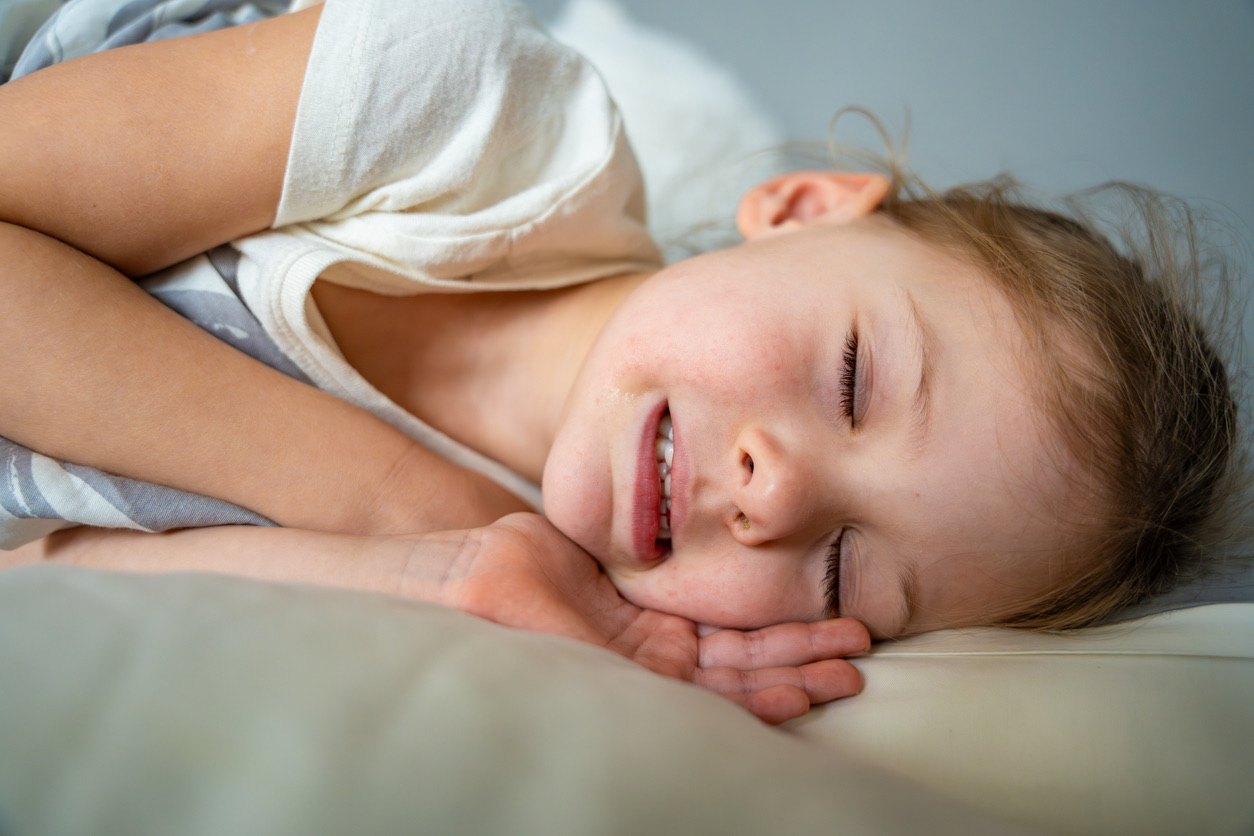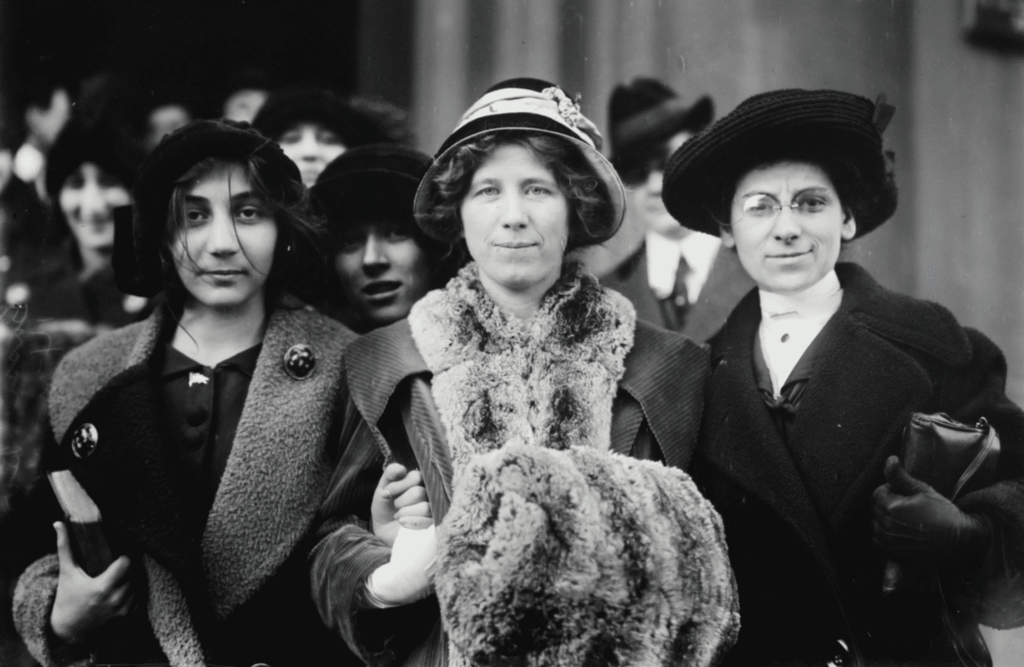If you've ever heard that telltale grating sound from your child's bedroom, you know what teeth grinding sounds like. But do you know what to do when you hear it? We spoke to Dr. Carly Gordon to learn what to do when your kid is grinding their teeth.
Kids generally don’t love the dentist; we’re not going to sugar coat it. So, when you’ve got them in for a routine appointment, you’ll want to be armed with any questions you have for the dentist or hygienist. Something that might come up is bruxism, a.k.a grinding. If you’ve noticed your kid is grinding their teeth, don’t worry—we asked Dr. Carly Gordon of Maple Dental Health in Vaughan, Ont., to help shed some light on this (kind-of) annoying and (definitely) problematic habit. Here’s what she told us.
ParentsCanada: When it comes to their kids’ teeth, most parents seem to be concerned about cavities or eventually having to pay for braces, but we don’t often hear the same concern/chat about kids who grind. Why do kids clench and grind and how do we even know if they’re doing it?
Dr. Carly Gordon: Bruxism is the medical term for grinding or clenching your teeth. It’s estimated that anywhere from six to 50 per cent of children engage in bruxism at night, and that’s a lot! In many cases, there’s no obvious reason for why your child is grinding their teeth, but there are some possible explanations, including some health-related causes to look out for. Reasons could be related to stress, anxiety, pain in their teeth, age, tooth malalignment, medication, sleep disorders and/or second-hand smoke.
Bruxism can start as soon as a baby’s teeth come in and can continue until adulthood. As an infant, bruxism may be a way to soothe discomfort associated with teething. As a toddler, it may be related to stress and separation anxiety. For school-agers, bruxism may emerge while they are losing their teeth, or it could be caused by one of the reasons above. Another reason could be a sleep disorder such as sleep apnea. One to five per cent of children have obstructive sleep apnea (OSA) and it often goes undiagnosed. This plays a huge role in bruxism and can actually be a sign for us dentists that there are sleep issues. The main reason for sleep apnea is related to the development of the airway, which includes the mouth, tonsils and adenoids. When these glands are enlarged, they constrict the airway, making breathing more difficult during sleep, and the child will compensate by grinding and clenching. Jaw development and those with a smaller jaw or larger overbite will also have an altered airway and be at risk for OSA. Having nasal allergies, being around adults who smoke and having a family history of OSA are also found to be risk factors for this disorder. It’s so important to watch our kids sleep to see if they’re grinding, and to see how they’re breathing.
PC: What does grinding do to our kids’ teeth and why is it crucial to a child’s oral health to properly deal with it? Can bruxism develop into a habit and continue into adulthood? We know some parents of toddlers are in the “their teeth are going to fall out anyway” camp, so they assume the wear and tear caused by bruxism doesn’t matter. We’re guessing you have a different view.
Dr. Carly Gordon: Signs of bruxism include tooth damage, such as broken teeth, and wearing down the teeth, which can often look like flattened teeth or small potholes on the top surfaces. Children who grind may be more sensitive to hot or cold food and drinks and become more prone to cavities. They may experience jaw or ear pain, headaches and/or occasional clicking or popping sounds. The most common and obvious sign is when you can hear the sounds caused by grinding when kids are sleeping.
Bruxism is common in children, however, most kids do outgrow it and don’t experience long-term issues. Of real importance is to determine the cause of the grinding and rule out more detrimental underlying issues. While grinding can damage the baby teeth—and this may be viewed as not an issue, since they will fall out—proper jaw development is very important when it comes to our airways. If underlying variables are not addressed in childhood, they can continue into adulthood. For some issues, it may be too late to correct as development is complete.
PC: How do dentists and hygienists handle bruxism in children? And what can parents do at home to help relieve uncomfortable symptoms?
Dr. Carly Gordon: When we notice signs of bruxism in children during their dental exams or cleaning, we start to ask the parent more questions: How are they sleeping? Do they breathe through their mouth or their nose? Do they have allergies? Do they complain their teeth or jaw hurts when eating? Do they avoid hard foods? We educate parents based on their answers. It may be that they can work with the child during the day on relaxing their face muscles or altering their diet to avoid hard foods and chewing gum. For very sensitive or broken-down teeth, there may be treatment options such as a filling or applying coating to the teeth to help cover these areas.
Sleep bruxism is closely tied to sleep quality. You can help improve your child’s sleep quality by ensuring their room is dark and quiet, limit the use of electronic media, provide them with a nutritious diet low in added sugars, and establish a bedtime routine that sets the stage for healthy sleep. We also recommend parents speak with their child’s paediatrician about their airways. They may need to be assessed for enlarged tonsils and adenoids by an ear, nose and throat specialist, or go for a sleep study to rule out OSA. It’s also important to treat any allergies and sinus inflammation, if applicable. Finally, if we notice jaw developmental issues, we may refer the patient to an orthodontist for assessment. There are appliances that create more space in the mouth and opens the airway for improved airflow.
PC: What can we do if we notice our kids are grinding in their sleep?
Dr. Carly Gordon: It’s always a good idea to bring it up to your paediatrician and dentist if you notice your child grinding their teeth. This way, your healthcare providers can rule out any underlying health or sleep issues and keep an eye on your child’s teeth to catch any problems before they become serious. Parents are often not aware of the consequences of bruxism. They think their kids will grow out of it. While this does often occur, growth and developmental changes may be occurring. It’s best to diagnose this early so intervention can be done before permanent changes occur. Most grinding is caught by a dentist, and this is just one reason why it’s so important to have your child see a dentist regularly starting at the age of one, or within six months of their first tooth coming in.
PC: We know mouth guards are common for clenching and grinding—do children use these, too? How can parents ensure little ones properly use their mouth guard or nightguard?
Dr. Carly Gordon: A mouth guard or nightguard can be used to help protect the teeth from bruxism. This is an appliance that covers the teeth and worn during sleep. Depending on the child’s age, it may not be tolerated and sometimes compliance is an issue. There are, however, other appliances that can be made from an orthodontist or paediatric dentist to help growth and protect the teeth at the same time. A consult for this would definitely be recommended. Parents would need to play an active role in ensuring their child is wearing their appliance. For young adolescents, if other causes of bruxism have been ruled out, then I always recommend a nightguard. Most people don’t even realize they are grinding when they are sleeping, so even if signs of this haven’t occurred yet in the mouth, I still prefer the preventive approach and recommend a nightguard.











